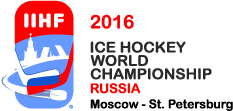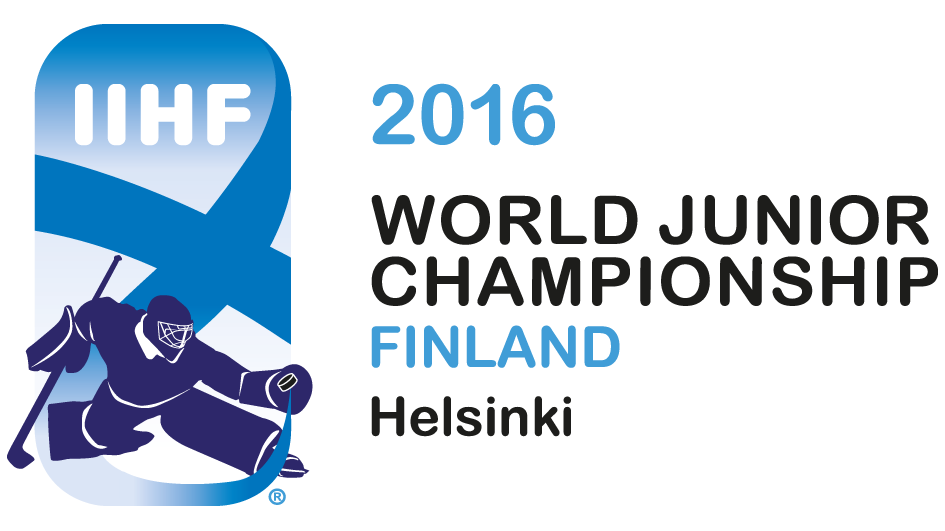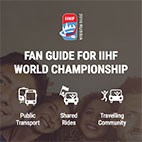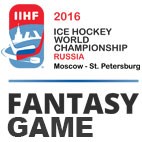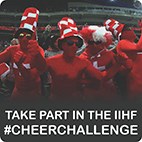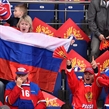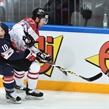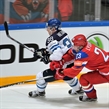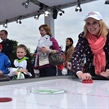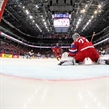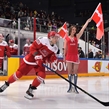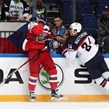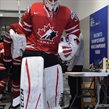Information
Tournament Format
The 16 teams are divided into two groups for the Preliminary Round.
The top-four ranked teams of each group advance to the quarter-finals that will be played cross-over. The first-place team in each preliminary-round group plays the fourth-place team of the other group, while the second-place team plays the third-place team of the other group. 1A-4B, 2A-3B, 1B-4A, 2B-3A. The winning teams advance to the semi-finals.
Semi-final pairings: Winner 1A-4B vs Winner 2B-3A, Winner 1B-4A vs Winner 2A-3B. Both semi-final games and the medal games will be played in Moscow.
The winning teams of the semi-final games advance to the gold medal game while the semi-final losing teams play for bronze.
Relegation format
The overall bottom ranked two of the 16 teams of the final ranking (see below) will be relegated to the 2017 IIHF Ice Hockey World Championship Division I Group A.
The 2017 IIHF Ice Hockey World Championship will consist of 16 teams including the teams of the organizing member national associations, thus neither Germany nor France can be among the two relegated teams.
The teams promoted to the 2017 IIHF Ice Hockey World Championship will be the top-two teams of the 2016 IIHF Ice Hockey World Championship Division I Group A.
Note: If the co-hosts for the 2017 IIHF Ice Hockey World Championship (Germany and France) end up in positions 7 and 8 in Group B during the 2016 IIHF Ice Hockey World Championship, only one team will be relegated – the 8th-ranked team of Group A – and only the winner of the 2016 IIHF Ice Hockey World Championship Division I Group A will be promoted.
Final Ranking / World Ranking
The gold medal game and bronze medal game will determine the final ranking for the top-4 teams. The eliminated teams from the preliminary round plus the losing teams of the quarter-finals will be ranked following their positions in the groups preceding the quarter-final round.
The final ranking will follow the following procedure:
1. Higher position in the group,
2. Higher number of points,
3. Better goal difference,
4. Higher number of goals scored for,
5. Better seeding number
The IIHF World Ranking will be produced after the IIHF Ice Hockey World Championship. It is based on the rankings of the four most recent IIHF Ice Hockey World Championships and of the last Olympic men’s ice hockey tournament (including qualification tournaments).
Click here for more information on the IIHF World Ranking system.
Three Point System
For all games points shall be awarded as follows:
- 3 points for the winning team at the conclusion of regulation time
- 1 point for both teams at the conclusion of regulation time if the game is tied
- An additional point earned for the team winning the game in a 5-minute overtime period, or the Game Winning Shots Procedure if the teams are still tied following conclusion of the overtime period
- 0 points for the team losing the game in regulation time
Overtime Operations
If a game is tied at the end of regulation time, a five-minute overtime period shall be played immediately after an intermission of three minutes. The teams will change ends for the overtime period. The game will end when the five minutes has expired or when a goal is scored; the scoring team will be declared the winner. If no goal is scored in the overtime period then the Game Winning Shots Procedure will apply. All overtime periods of any IIHF game shall be played with each team at the numerical strength of four (4) skaters and one (1) goalkeeper.
Overtime procedure in Play-Off Games:
- In case of a tie at the conclusion of regulation time in a Relegation Playoff, Placement Playoff, Quarter Final, Semi Final and Bronze Medal Game, there will be a 10-minute sudden-death overtime period played, following a three-minute intermission.
- The teams will change ends for the overtime period.
- The team, which scores a goal during this period is the winner.
- In the Gold Medal game there will be a 20-minute sudden-death overtime period, following a 15-minute intermission during which the ice will be resurfaced.
- The teams will change ends.
- The team which scores a goal during this period is declared winner.
- If no goal is scored during the sudden-death overtime, there will be Game Winning Shot (GWS) competition ("shootout") according to the Game Winning Shots Procedure.
Game Winning Shots Procedure
If no goal is scored in the overtime period then the Game Winning Shots (GWS) procedure will apply. The following procedure will be utilized:
-
Shots will be taken at both ends of the ice surface. The 14-meter wide longitudinal centre section of the rink, between the Face-Off Spots in the neutral and end zones, will be dry-scraped by the ice-resurfacing machine prior to the Game Winning Shots during the time required to organize the program accordingly.
-
The procedure will begin with three different shooters from each team taking alternate shots. The players do not need to be named beforehand. Eligible to participate in the Game Winning Shots will be the four goalkeepers and all players from both teams listed on the official game sheet except as specified in article 3 below.
-
Any player whose penalty had not been completed when the overtime period ended is not eligible to be one of the players selected to take the shots and must remain in the penalty box or in the dressing room. Also players serving penalties imposed during the game winning shots must remain in the penalty box or in the dressing room until the end of the procedure.
-
The Referee will call the two captains to the Referee Crease and flip a coin to determine which team takes the first shot. The winner of the coin toss will have the choice whether his team will shoot first or second.
-
The goalkeepers shall defend the same goal as in the overtime period and may remain at their goal creases while the opposing team is taking a shot.
-
The goalkeepers from each team may be changed after each shot.
-
The shots will be taken in accordance with rule 509 of the IIHF Official Rule Book.
-
The players of both teams will take the shots alternately until a decisive goal is scored. The remaining shots will not be taken.
-
If the result is still tied after 3 shots by each team the procedure shall continue with a tie-break shoot-out by one player of each team, with the same or new players with the other team starting to take the tie-break shots. The same player can also be used for each shot by a team in the tie-break shoot-out. The game shall be finished as soon as a duel of two players brings the decisive result.
-
The Official Scorekeeper will record all shots taken, indicating the players, goalkeepers and goals scored.
-
Only the decisive goal will count in the result of the game. It shall be credited to the player who scored and to the goalkeeper concerned.
-
If a team declines to participate in the game winning shots procedure the game will be declared as a loss for that team and the other team will be awarded 3 points for a win. If a player declines to take a shot it will be declared "no score" for his team.
Tie breaking formula
The tie-breaking system for two teams with the same number of points in a standing will be the game between the two teams, the winner of the game taking precedence.
Due to the fact that the three-point system does not allow a game to end in a tie, then the following tie breaking procedure is applicable when three or more teams are tied in points in a Championship standing.
Should three or more teams be tied on points, then a tie breaking formula will be applied as follows, creating a sub-group amongst the tied teams. This process will continue until only two or none of the teams remain tied. In the case of two tied teams remaining, the game between the two would then be the determining tie-breaker as the game could not end as a tie. In the case of none of the teams being tied, the criteria specified in the respective step applies.
Step 1: Taking into consideration the games between each of the tied teams, a sub-group is created applying the points awarded in the direct games amongst the tied teams from which the teams are then ranked accordingly.
Step 2: Should three or more teams still remain tied in points then the better goal difference in the direct games amongst the tied teams will be decisive.
Step 3: Should three or more teams still remain tied in points and goal difference then the highest number of goals scored by these teams in their direct games will be decisive
Step 4: Should three or more teams still remain tied in points, goal difference and goals scored then the results between each of the three teams and the closest best-ranked team outside the sub-group will be applied. In this case the tied team with the best result (1. points, 2. goal difference, 3. more goals scored) against the closest best ranked-team will take precedence
Step 5: Should the teams still remain tied, then the results between each of the three teams and the next highest best-ranked team outside the sub-group will be applied.
Step 6: Should the teams still remain tied after these five steps have been exercised then Sport considerations will be applied and the teams will be ranked by their positions coming into the Championship (seeding).
Note: If not all mutual games have been played yet in an ongoing tournament, the tied teams will be ranked in the standings according to the following criteria: 1. Lower number of games played, 2. Goal difference, 3. Goals scored, 4. Positions coming into the Championship.
More information
Click here to download the IIHF’s Rule Book and Sport Regulations.
Player Entry
- The teams submit the names of the participating players at the first Championship Directorate.
- The maximum number of players allowed on a Team Registration Form at the beginning of the World Championship is 22 skaters and 3 goalies. The minimum is 15 skaters and 2 goalies.
- At the first Directorate meeting, the teams must name at least the minimum number of 15 skaters and 2 goalkeepers. The players entered must be present at the championship venue by the time of the Directorate meeting.
- The remaining players up to the allowed maximum of 22 + 3 must be submitted for players' control two hours before any of the following championship games. Players can be added throughout the tournament until the roster is full.
- During a game, a team may enter (dress) 20 skaters and 2 goalkeepers on the Official Game Sheet, with the emergency goalkeeper standing by if a goalie entered to the Official Game Sheet is unable to play.
Eligibility
To play in the IIHF World Championship, the Olympic ice hockey tournament and the qualifications to these competitions, players must fulfill the following qualification requirements:
- Each player must be under the jurisdiction of an IIHF member national association
- Each player must be a citizen of the country he represents.
Acquiring a new national eligibility (The ‘two-year’ case)
When a player has changed his citizenship or has acquired another citizenship and wants to participate for the first time in an IIHF competition representing his new country he must:
- Prove that he has participated for at least two consecutive hockey seasons and 16 consecutive months (480 days) in the national competitions of his new country after his 10th birthday during which period he has neither transferred to another country nor played ice hockey within any other country.
- Have an international transfer card (ITC) that shows the transfer to the national competition of his new country and which was approved and dated at least 16 months (480 days) prior to his proposed participation.
Change of national eligibility (The ‘four-year’ case)
A player, who has previously participated in IIHF competition, can switch national eligibility (but only once in a player's life) if:
- He is a citizen of the new country of his choice.
- He has participated for at least four consecutive years (1460 days) in the national competitions of his new country, during which period he has neither transferred to another country nor played ice hockey within any other country and has not played for his previous country in an IIHF competition during this four year period.
- He has an international transfer card (ITC) that shows the transfer to the national competition of his new country and which was approved and dated at least four years before the start of the IIHF competition in which he wishes to participate.
Ticket Information
The ticket sale is organized in three stages beginning in November, December and April respectively. The ticket prices start at 1,500 Rubles (approx. €19).
Fans can buy tickets in several ways:
- On the website of the championship official booking agent: www.parter.ru
- On the official World Championship website: www.iihfworlds2016.com
- In the Moscow ticket office: Okhotny Ryad St., 2, Trade Gallery "Fashionable Season", ground floor, an entrance from Revolyutsi Square.
- At the St. Petersburg ticket office: Nevski Avenue 114-116, Nevski Centre Mall
- In partner ticket offices which addresses are available here.
- By phone: +7(495)258-0000 (Moscow), +7 (812) 929-2883 (St. Petersburg)
- By e-mail: contact@parter.ru
- On the website kassir.ru and at KHL clubs.
For legal entities:
- By phone: +7(495)258-0000;
- By e-mail: b2b@parter.ru; on the website of the official booking operator parter.ru or in ticket offices which addresses are available on this site.
| Games | Package / Game | Start sale | Cat. 1 | Cat. 2 | Cat. 3 |
| Single-game tickets Moscow | |||||
| 1 | Preliminary round | April 2016 | 4500 RUB |
3000 RUB | 1875 RUB |
| 1 | Quarter-final | April 2016 | 8250 RUB |
6750 RUB | 4875 RUB |
| 1 | Semi-final | April 2016 | 13500 RUB |
11250 RUB | 8250 RUB |
| 1 | Bronze medal game | April 2016 | 11250 RUB |
8250 RUB | 6750 RUB |
| 1 | Final | April 2016 | 22500 RUB |
18000 RUB | 13500 RUB |
| Single-game tickets St. Petersburg | |||||
| 1 | Prel. Round (Games 6, 8, 10, 22, 24, 50) | 6 March 2016 | 3600 RUB |
2400 RUB | 1500 RUB |
| 1 | Prel. Round (Games 10, 26, 30, 34, 36, 40, 44, 52, 54) | 6 March 2016 | 4050 RUB |
2700 RUB | 1700 RUB |
| 1 | Prel. Round (Games 2, 4,12, 14, 18, 20, 28, 32, 38, 42, 46, 48, 56) | 6 March 2016 | 4500 RUB |
3000 RUB | 1875 RUB |
| 1 | Quarter-final | 6 March 2016 | 7425 RUB |
6075 RUB | 4400 RUB |
| Day Packages Moscow | |||||
| 2 | Day Ticket (2 games) | 7 Dec. 2015 | 9 000 RUB |
6 000 RUB | 3 750 RUB |
| 3 | Day Ticket (3 games) | 7 Dec. 2015 | 13 500 RUB |
9 000 RUB | 5 625 RUB |
| Day Packages St. Petersburg | |||||
| 2 | Day ticket 10 May (SVK-GER/HUN-FRA) |
27 Jan. 2016 | 7 200 RUB |
4 800 RUB | 3 000 RUB |
| 2 | Day ticket 13 May (USA-HUN/GER-BLR); Day ticket 16 May (CAN-FRA/GER-HUN) |
27 Jan. 2016 | 8 100 RUB |
5 400 RUB | 3 400 RUB |
| 2 | Day ticket 11 May (SVK-BLR/FIN-HUN); Day ticket 12 May 12th (USA-FRA/CAN-GER); Day ticket 15 May (GER-USA/SVK-FIN) |
27 Jan. 2016 | 8 550 RUB |
5 700 RUB | 3 575 RUB |
| 2 | Day ticket 6 May (USA-CAN/FIN-BLR); Day ticket 9 May (BLR-CAN/FIN-USA) |
27 Jan. 2016 | 9 000 RUB |
6 000 RUB | 3 750 RUB |
| 3 | Day ticket 7 May (SVK-HUN/FRA-GER/BLR-USA) |
27 Jan. 2016 | 11 250 RUB |
7 500 RUB | 4 700 RUB |
| 3 | Day ticket 8 May (HUN-CAN/FIN-GER/FRA-SVK); Day ticket 17 May (USA-SVK/BLR-FRA/CAN-FIN) |
27 Jan. 2016 | 12 600 RUB |
8 400 RUB | 5 250 RUB |
| 3 | Day ticket 14 May (FRA-FIN/HUN-BLR/CAN-SVK) |
27 Jan. 2016 | 13 050 RUB |
8 700 RUB | 5 445 RUB |
| All games at a venue | |||||
| 34 | Venue Package Moscow | 6 Nov. 2015 | 193 087,5 RUB |
138 937,5 RUB | 94 050 RUB |
| Preliminary-Round Ticket | |||||
| 28 | Group Package Moscow | 6 Nov. 2015 | 119 700 RUB |
79 800 RUB | 49 875 RUB |
| Team Ticket (Preliminary Round) | |||||
| 7 | Team Ticket Moscow | 6 Nov. 2015 | 31 500 RUB |
21 000 RUB | 13 125 RUB |
| Final Round Ticket | |||||
| 6 | Final Round Package Moscow | 6 Nov. 2015 | 77 250 RUB |
62 250 RUB | 46 500 RUB |
| 2 | 1/4-Final Package St. Petersburg | 29 Dec. 2015 | 14 850 RUB |
12 150 RUB | 8 775 RUB |
| Final Weekend | |||||
| 4 | Final Weekend Ticket Moscow | 6 Nov. 2015 | 60 750 RUB | 48 750 RUB | 36 750 RUB |
Mascot
Laika was named as official mascot of the 2016 IIHF Ice Hockey World Championship to be held from 6 to 22 May in Moscow and St. Petersburg.
The presentation of the official mascot took place at the evening show “Vecherny Urgent” on Channel One. The guests of the show were the Vladislav Tretiak, the President of the Ice Hockey Federation of Russia who was heading the jury of the mascot competition, and two-time world champion and former national team captain Alexei Morozov.
The official mascot of the 2016 IIHF Ice Hockey World Championship was selected by members of the International Ice Hockey Federation (IIHF) and the Ice Hockey Federation of Russia (FHR).
The other finalists were “Kot Matros” (Sailor Cat), “Samovar Dyumok” (Vaporing Samovar) and “Russki Bogatyr” (Russian Giant).
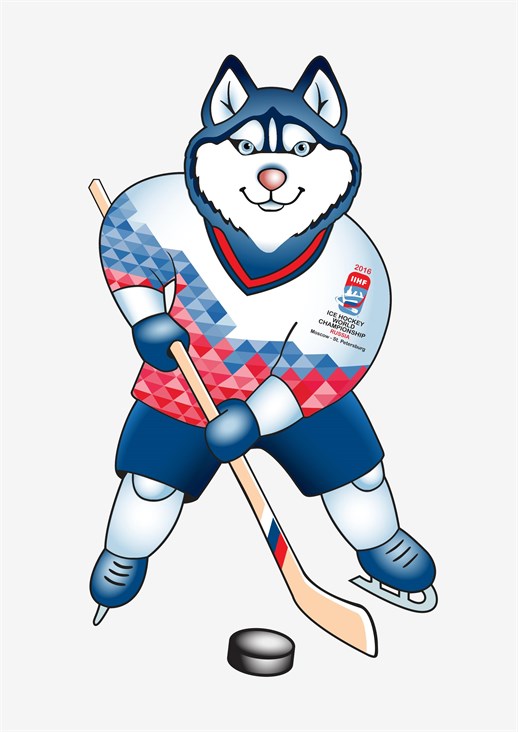
TV Listings
The 2016 IIHF Ice Hockey World Championship will be broadcast in 160 countries and territories.
Click here for the list of broadcasters.
Adding visibility in territories where no or no conflicting media rights agreements are in place, a high quality live video streaming service will be offered online on the event's YouTube channel.
Coaching Symposium
During the 2016 IIHF Ice Hockey World Championship the IIHF International Coaching Symposium will take place, from 13 to 15 May in Moscow.
The symposium is organized by the International Ice Hockey Federation, the Ice Hockey Federation of Russia and the 2016 IIHF Ice Hockey World Championship Organizing Committee.
The main topics will be the head coach’s role as a team leader, key tendencies in hockey worldwide and features of a modern training process.
The majority of speakers are head coaches with great international, NHL and KHL experience.
The symposium will be held in English and Russian with simultaneous translation.
Dates:
13-15 May 2016
Location:
Conference hall, Hotel Holiday Inn, Rusakovskaya street 24, Moscow, Russian Federation
Registration Fee:
280 Euro
380 Euro (accommodation included)
Please note that registration fee is non-refundable.
Registration Fee includes:
Symposium attendance, participant’s material package, lunch, coffee and snack breaks, three tickets to the 2016 IIHF Ice Hockey World Championship games (one ticket per person per game).
Registration deadline:
22 April 2016
Registration:
Elena Stolyarchuk
Manager of department of sport programs
City booking & travel centre
Phone: +7(962) 928-14-02
E-mail: StolyarchukEV@cbtc.ru
Questions:
Daniil Kupriyanov
Coordinator Russian Men’s National Team
Russian Ice Hockey Federation
Phone: +7(964) 728-11-42
E-mail: d.kupriyanov@fhr.ru
Registration Form
Tentative Program
Speakers:
Boris Mayorov (RUS) - Honoured Coach
Olympic Gold Medal (2 times), Soviet Champion (3 times), Finnish Liiga Champion, IIHF Hall of Fame member
Vladimir Yurzinov (RUS) - Honoured Coach, Senior Advisor of the Russian men's national team
Canada Cup Champion, World Championship Gold Medal (7 times), Finnish Liiga Champion (2 times), European Cup Champion (3 times), Olympic Silver Medal (3x Gold, 2x Silver, 1x Bronze), NLA Coach of the Year, IIHF Hall of Fame member, Finnish Hockey Hall of Fame member.
Mike Keenan (CAN) - Senior Advisor of Metallurg Magnitogorsk (KHL)
OMJHL Champion, AHL Calder Cup Champion, Canada Cup Champion, NHL Stanley Cup Champion, KHL Gagarin Cup Champion.
Darius Kasparaitis (RUS) - Hockey expert, long-time NHL player
Olympic Medallist (1x Gold, 1x Silver, 1x Bronze), U20 WJC Gold Medal, U20 WJC Silver Medal, U20 WJC Best Defenceman.
Alexei Yashin (RUS) - Hockey Expert
U20 WJC Gold Medal, World Championship Gold Medal, NHL All-Star Game (3 times), Olympic Silver Medal, Olympic Bronze Medal, World Championship Bronze Medal, KHL Most Assists.
Alexander Khavanov (RUS) - Hockey Expert
Defender who played 5 seasons at NHL, Russia Champion, NLA Champion.
John Jansson (SWE) - Psychological coach of Frolunda (SHL)
U20 WJC Champion, CHL Champion.
Roger Ronnberg (SWE) - Head Coach of Frolunda Gothenburg (SHL)
U20 WJC Champion, U20 WJC Silver Medal, CHL Champion.
Erkka Westerlund (FIN) – Head Coach of Jokerit Helsinki (KHL)
Finnish Hockey Hall of Fame, SM-liiga Champion, Olympic Silver Medal, Olympic Bronze Medal, World Championship Bronze Medal, World Championship Silver Medal
Sergei Nemchinov (RUS) – General Manager of Torpedo Ust-Kamenogorsk (VHL/Kazakhstan)
U20 WJC Gold Medal (2 times), NHL Stanley Cup Champion, Russia Champion
U20 WJC Bronze Medal (2 times)
Mark Crawford (CAN) – Head Coach of the ZSC Lions Zurich (NLA)
AHL Coach of the Year, NHL Coach of the Year, NHL Stanley Cup Champion, NLA Champion, NLA Media Best Coach, Swiss Cup Winner
Kirill Fastovski (RUS) – General manager of Sibir Novosibirsk (KHL), KHL Bronze Medal
Vladislav Zankovets (BLR) - Conditioning coach of Dynamo Minsk (KHL)
Hannu Nykvist (FIN) - Goalie coach of Red Bull Salzburg (Austria)
Norbert Javorcik (SVK) – Coach of Slovakia U20, U18/U20 WJC Bronze Medal
Past Medallists
| IIHF Ice Hockey World Championships | ||||
| Year | Gold | Silver | Bronze | Venue |
| 1920 | Canada | USA | Czechoslovakia | Antwerp (Olympics) |
| 1924 | Canada | USA | Great Britain | Chamonix (Olympics) |
| 1928 | Canada | Sweden | Switzerland | St. Moritz (Olympics) |
| 1930 | Canada | Germany | Switzerland | Chamonix, Berlin, Vienna |
| 1931 | Canada | USA | Austria | Krynica |
| 1932 | Canada | USA | Germany | Lake Placid (Olympics) |
| 1933 | USA | Canada | Czechoslovakia | Prague |
| 1934 | Canada | USA | Germany | Milan |
| 1935 | Canada | Switzerland | Great Britain | Davos |
| 1936 | Great Britain | Canada | USA | Garmisch-Partenkirchen (Olympics) |
| 1937 | Canada | Great Britain | Switzerland | London |
| 1938 | Canada | Great Britain | Czechoslovakia | Prague |
| 1939 | Canada | USA | Switzerland | Basle, Zurich |
| 1940-1946 No championships (World War II) | ||||
| 1947 | Czechoslovakia | Sweden | Austria | Prague |
| 1948 | Canada | Czechoslovakia | Switzerland | St. Moritz (Olympics) |
| 1949 | Czechoslovakia | Canada | USA | Stockholm |
| 1950 | Canada | USA | Switzerland | London |
| 1951 | Canada | Sweden | Switzerland | Paris |
| 1952 | Canada | USA | Sweden | Oslo (Olympics) |
| 1953 | Sweden | FR Germany | Switzerland | Zurich, Basle |
| 1954 | Soviet Union | Canada | Sweden | Stockholm |
| 1955 | Canada | Soviet Union | Czechoslovakia | Krefeld, Dortmund, Cologne |
| 1956 | Soviet Union | USA | Canada | Cortina (Olympics) |
| 1957 | Sweden | Soviet Union | Czechoslovakia | Moscow |
| 1958 | Canada | Soviet Union | Sweden | Oslo |
| 1959 | Canada | Soviet Union | Czechoslovakia | Prague, Bratislava |
| 1960 | USA | Canada | Soviet Union | Squaw Valley (Olympics) |
| 1961 | Canada | Czechoslovakia | Soviet Union | Geneva, Lausanne |
| 1962 | Sweden | Canada | USA | Colorado Springs, Denver |
| 1963 | Soviet Union | Sweden | Czechoslovakia | Stockholm |
| 1964 | Soviet Union | Sweden | Czechoslovakia | Innsbruck (Olympics) |
| 1965 | Soviet Union | Czechoslovakia | Sweden | Tampere |
| 1966 | Soviet Union | Czechoslovakia | Canada | Ljubljana |
| 1967 | Soviet Union | Sweden | Canada | Vienna |
| 1968 | Soviet Union | Czechoslovakia | Canada | Grenoble (Olympics) |
| 1969 | Soviet Union | Sweden | Czechoslovakia | Stockholm |
| 1970 | Soviet Union | Sweden | Czechoslovakia | Stockholm |
| 1971 | Soviet Union | Czechoslovakia | Sweden | Berne, Geneva |
| 1972 | Czechoslovakia | Soviet Union | Sweden | Prague |
| 1973 | Soviet Union | Sweden | Czechoslovakia | Moscow |
| 1974 | Soviet Union | Czechoslovakia | Sweden | Helsinki |
| 1975 | Soviet Union | Czechoslovakia | Sweden | Munich, Dusseldorf |
| 1976 | Czechoslovakia | Soviet Union | Sweden | Katowice |
| 1977 | Czechoslovakia | Sweden | Soviet Union | Vienna |
| 1978 | Soviet Union | Czechoslovakia | Canada | Prague |
| 1979 | Soviet Union | Czechoslovakia | Sweden | Moscow |
| 1981 | Soviet Union | Sweden | Czechoslovakia | Gothenburg, Stockholm |
| 1982 | Soviet Union | Czechoslovakia | Canada | Helsinki, Tampere |
| 1983 | Soviet Union | Czechoslovakia | Canada | Dusseldorf, Dortmund, Munich |
| 1985 | Czechoslovakia | Canada | Soviet Union | Prague |
| 1986 | Soviet Union | Sweden | Canada | Moscow |
| 1987 | Sweden | Soviet Union | Czechoslovakia | Vienna |
| 1989 | Soviet Union | Canada | Czechoslovakia | Stockholm, Sodertalje |
| 1990 | Soviet Union | Sweden | Czechoslovakia | Berne, Fribourg |
| 1991 | Sweden | Canada | Soviet Union | Turku, Helsinki, Tampere |
| 1992 | Sweden | Finland | Czechoslovakia | Prague, Bratislava |
| 1993 | Russia | Sweden | Czech Republic | Dortmund, Munich |
| 1994 | Canada | Finland | Sweden | Bolzano, Canazei, Milan |
| 1995 | Finland | Sweden | Canada | Stockholm, Gavle |
| 1996 | Czech Republic | Canada | USA | Vienna |
| 1997 | Canada | Sweden | Czech Republic | Helsinki, Turku, Tampere |
| 1998 | Sweden | Finland | Czech Republic | Zurich, Basle |
| 1999 | Czech Republic | Finland | Sweden | Oslo, Lillehammer, Hamar |
| 2000 | Czech Republic | Slovakia | Finland | St. Petersburg |
| 2001 | Czech Republic | Finland | Sweden | Cologne, Hanover, Nuremberg |
| 2002 | Slovakia | Russia | Sweden | Gothenburg, Karlstad, Jonkoping |
| 2003 | Canada | Sweden | Slovakia | Helsinki, Turku, Tampere |
| 2004 | Canada | Sweden | USA | Prague, Ostrava |
| 2005 | Czech Republic | Canada | Russia | Vienna, Innsbruck |
| 2006 | Sweden | Czech Republic | Finland | Riga |
| 2007 | Canada | Finland | Russia | Moscow, Mytishi |
| 2008 | Russia | Canada | Finland | Quebec City, Halifax |
| 2009 | Russia | Canada | Sweden | Berne, Zurich-Kloten |
| 2010 | Czech Republic | Russia | Sweden | Cologne, Mannheim, Gelsenkirchen |
| 2011 | Finland | Sweden | Czech Republic | Bratislava, Kosice |
| 2012 | Russia | Slovakia | Czech Republic | Helsinki, Stockholm |
| 2013 | Sweden | Switzerland | USA | Stockholm, Helsinki |
| 2014 | Russia | Finland | Sweden | Minsk, Belarus |
| 2015 | Canada | Russia | USA | Prague, Ostrava |
| 2016 | Canada | Finland | Russia | Moscow, St. Petersburg |
|
Notes: |
||||
| All Olympic Ice Hockey Tournaments between 1920 and 1968 also counted as World Championships. | ||||
| In the Olympic years 1980, 1984 and 1988, no IIHF World Championships were staged. | ||||
| IIHF Ice Hockey European Championships | ||||
| Year | Gold | Silver | Bronze | Venue |
| 1910 | Great Britain | Germany | Belgium | Les Avants |
| 1911 | Bohemia | Germany | Belgium | Berlin |
| 1912 | Championship annulled | |||
| 1913 | Belgium | Bohemia | Germany | Munich |
| 1914 | Bohemia | Germany | Belgium | Berlin |
| 1915-1920 No championships (World War I) | ||||
| 1921 | Sweden | Czechoslovakia | (only two teams) | Stockholm |
| 1922 | Czechoslovakia | Sweden | Switzerland | St. Moritz |
| 1923 | Sweden | France | Czechoslovakia | Antwerp |
| 1924 | France | Sweden | Switzerland | Milan |
| 1925 | Czechoslovakia | Austria | Switzerland | Strbske Pleso, Stary Smokovec |
| 1926 | Switzerland | Czechoslovakia | Austria | Davos |
| 1927 | Austria | Belgium | Germany | Vienna |
| 1929 | Czechoslovakia | Poland | Austria | Budapest |
| 1932 | Sweden | Austria | Switzerland | Berlin |
| Notes: | ||||
| Berlin 1932 was the last separate IIHF European Championship event. | ||||
| European Championships medals were awarded to the European participants of the IIHF World Championships until 1991. | ||||
World Ranking
The 2016 IIHF Men's World Ranking includes the IIHF Ice Hockey World Championships played between 2013 and 2016 as well as the 2014 Olympics.
The IIHF World Ranking is a tool to reflect the long-term quality of the countries' national team programs, taking into consideration the results over four years. It is used to determine the seeding in the IIHF Ice Hockey World Championship as well as to determine the seeding and which teams are automatically qualified for Olympic Winter Games
Click here for more information on the IIHF World Ranking system.
2016 IIHF Men's World Ranking
| Points | Movement | |||
| 1 | Canada | 3495 | 0 | |
| 2 | Russia | 3380 | 0 | |
| 3 | Finland | 3355 | +1 | |
| 4 | USA | 3290 | +1 | |
| 5 | Sweden | 3275 | -2 | |
| 6 | Czech Republic | 3210 | 0 | |
| 7 | Switzerland | 2910 | 0 | |
| 8 | Slovakia | 2870 | 0 | |
| 9 | Belarus | 2820 | 0 | |
| 10 | Germany | 2815 | +3 | |
| 11 | Norway | 2765 | 0 | |
| 12 | Latvia | 2730 | -2 | |
| 13 | Denmark | 2700 | +2 | |
| 14 | France | 2655 | -2 | |
| 15 | Slovenia | 2530 | -1 | |
| 16 | Kazakhstan | 2470 | +1 | |
| 17 | Austria | 2440 | -1 | |
| 18 | Italy | 2345 | 0 | |
| 19 | Hungary | 2325 | 0 | |
| 20 | Poland | 2175 | +2 | |
| 21 | Japan | 2140 | -1 | |
| 22 | Ukraine | 2105 | -1 | |
| 23 | Korea | 2090 | 0 | |
| 24 | Great Britain | 2020 | 0 | |
| 25 | Lithuania | 1900 | +1 | |
| 26 | Croatia | 1825 | +1 | |
| 27 | Netherlands | 1825 | -2 | |
| 28 | Estonia | 1755 | +1 | |
| 29 | Romania | 1735 | -1 | |
| 30 | Spain | 1550 | +1 | |
| 31 | Serbia | 1520 | -1 | |
| 32 | Belgium | 1300 | +2 | |
| 33 | Mexico | 1290 | -1 | |
| 34 | Israel | 1250 | -1 | |
| 35 | Iceland | 1240 | 0 | |
| 36 | Australia | 1160 | 0 | |
| 37 | China | 1075 | +1 | |
| 38 | New Zealand | 1000 | -1 | |
| 39 | Bulgaria | 870 | 0 | |
| 40 | DPR Korea | 825 | +2 | |
| 41 | Turkey | 805 | 0 | |
| 42 | South Africa | 795 | -2 | |
| 43 | Luxembourg | 680 | 0 | |
| 44 | Georgia | 635 | +1 | |
| 45 | Hong Kong | 545 | +1 | |
| 46 | Bosnia & Herzegovina | 390 | +1 | |
| 47 | United Arab Emirates | 340 | -3 | |
| 48 | Ireland | 65 | 0 | |
| 49 | Greece | 60 | 0 | |
| 50 | Mongolia | 50 | 0 |
IIHF Men's World Ranking as of 22 May 2016.
Media Accreditation
Print/Photography accreditation for the 2016 IIHF Ice Hockey World Championship in Moscow and St. Petersburg, Russia, can be requested online until 1 February 2016.
For radio and TV requests as well as websites with audio/video coverage please contact Wanda Bura at Infront Sports – Wanda.Bura@infrontsports.com.
Media hotels can be booked until 31 March 2016: Hotels in Moscow, Hotels in St. Petersburg, Booking Form
Contacts
International Ice Hockey Federation
Address Headquarters:
Brandschenkestrasse 50, Postfach, 8027 Zurich, Switzerland
Tel. +41 44 562 22 00
Fax +41 44 562 22 29
E-mail Office: office@iihf.com
E-mail Media Relations: media@iihf.com
E-mail Website: webmaster@iihf.com
Photo service: www.imagesonice.net
2016 IIHF Ice Hockey World Championship Organization Committee
Address:
Skatertny per. 4/2, Moscow, 121069, Russia
Tel. +7 (495) 690-21-63
E-mail: volovets@dszm.ru

